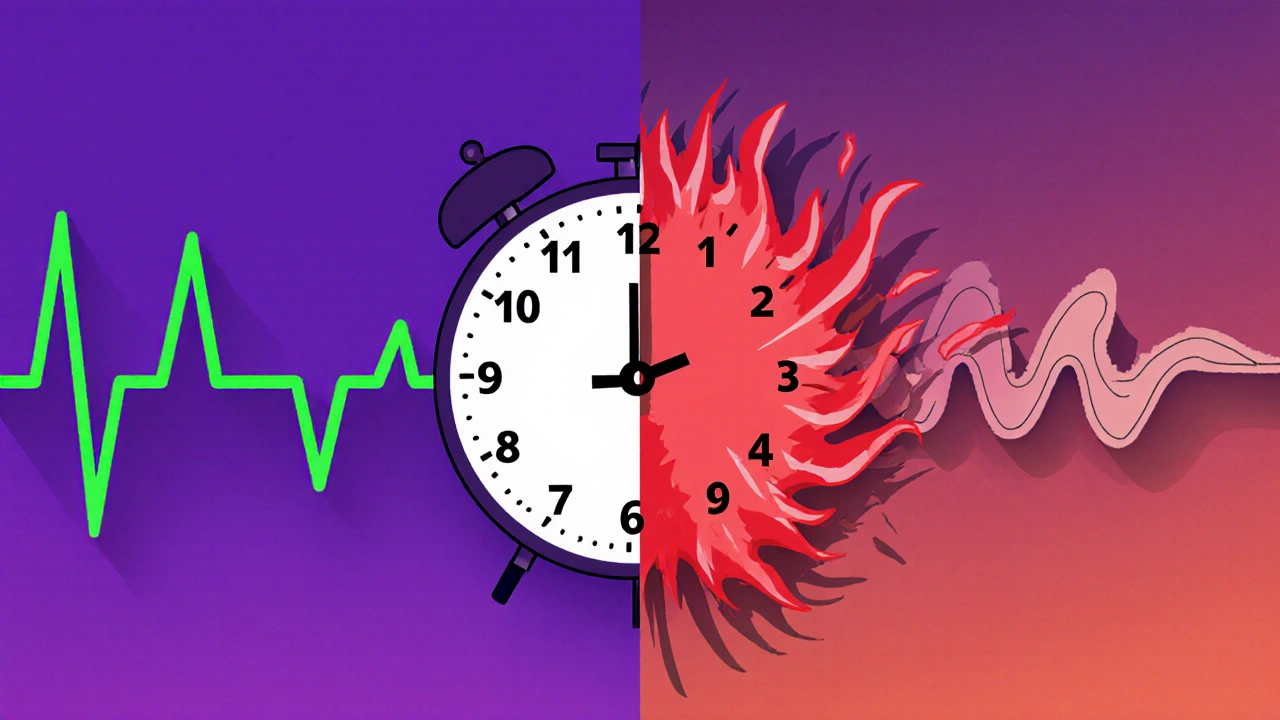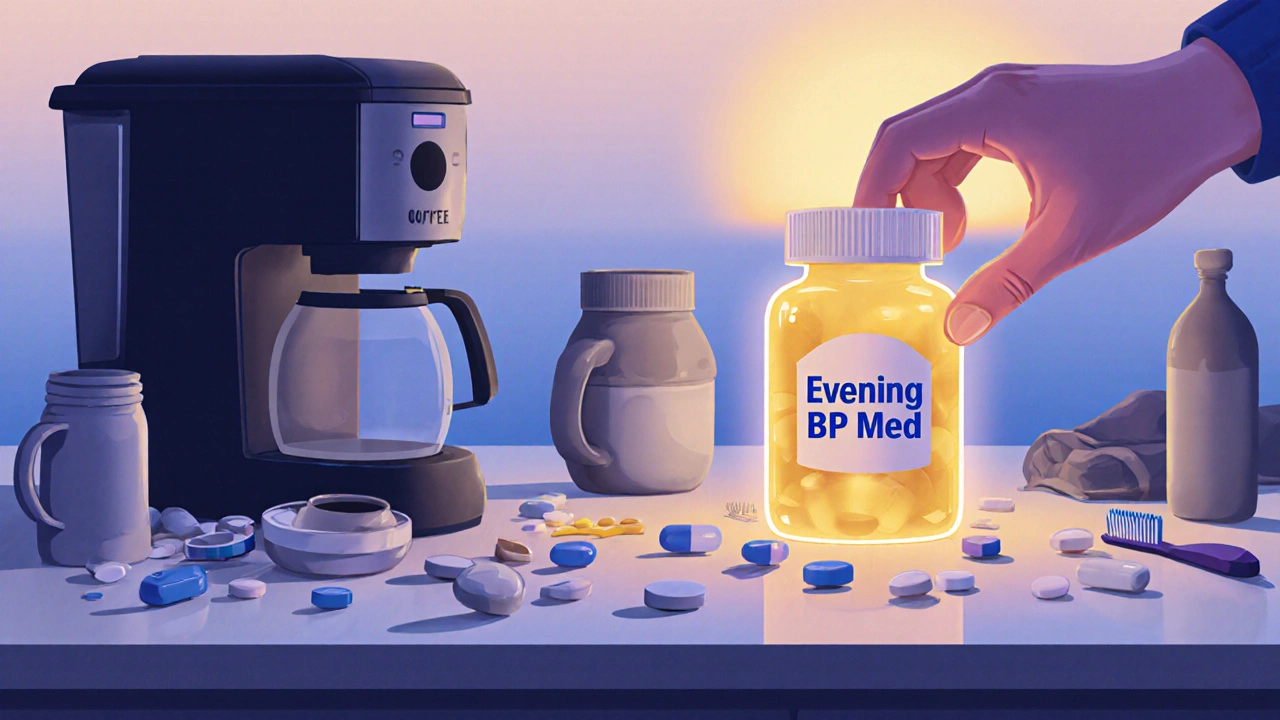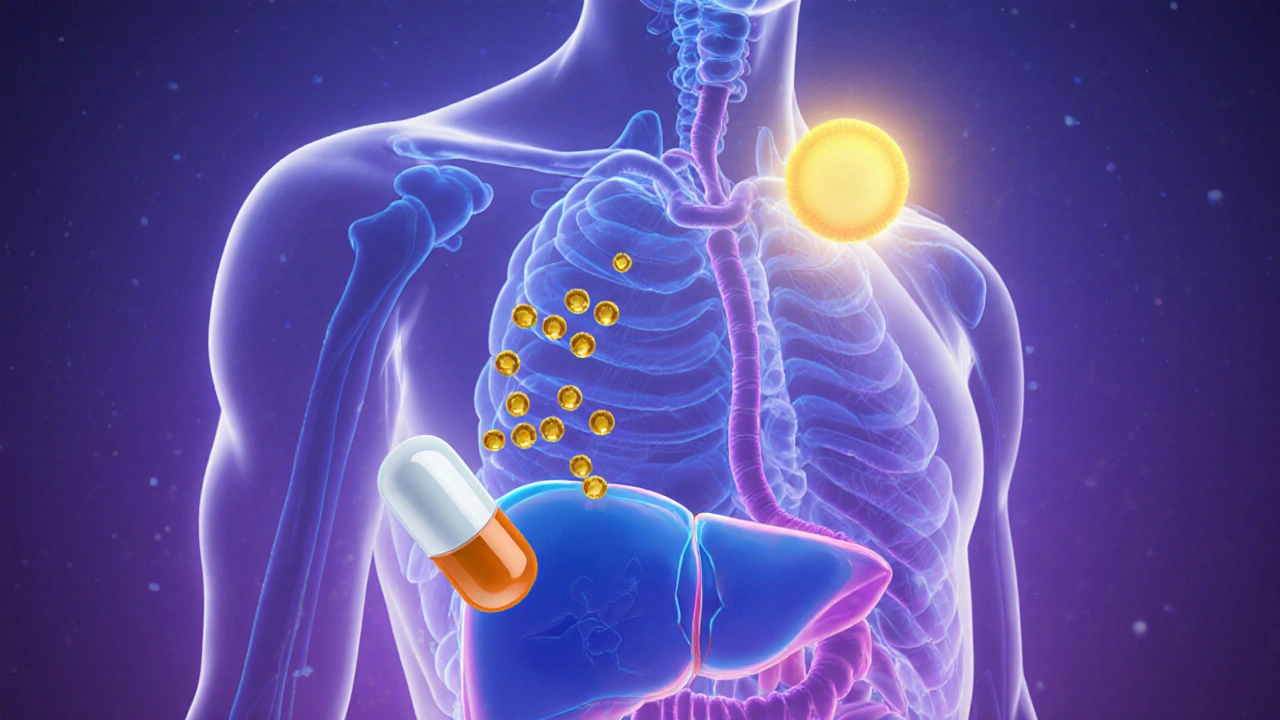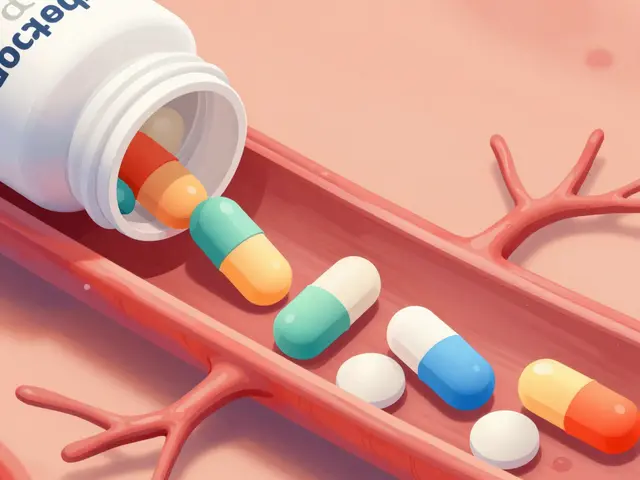Medication Timing Calculator
Select Your Medication
Timing Analysis
Select a medication and enter your intended time to see timing analysis
Key Timing Facts
Statin (Cholesterol)
Best taken at night for 15-20% greater cholesterol reduction
Your liver produces most cholesterol while you sleep
Taking in morning: 20% less effective
Insulin
Must be taken within 15 minutes of meal
Critical for preventing hypoglycemia or hyperglycemia
Timing error: 22% increased hypoglycemia risk
Warfarin
Best taken at same time daily (often evening)
Clotting factors follow daily rhythms
Timing error: 37% increased bleeding risk
Chemotherapy
Must be taken within 30 minutes of scheduled time
Cancer cells divide at specific times
Timing error: 15-20% reduced effectiveness
What if taking your pill five minutes earlier-or later-could mean the difference between feeling fine and ending up in the hospital? It sounds extreme, but for many medications, the time of day you take them isn’t just a suggestion. It’s a medical decision that directly impacts how well the drug works and how many side effects you get.
Why Timing Matters More Than You Think
Your body runs on a 24-hour clock. Not just your sleep-wake cycle, but your liver, kidneys, heart, and even your stomach lining follow daily rhythms. These rhythms affect how your body absorbs, breaks down, and gets rid of drugs. Take a statin in the morning? You might get only half the cholesterol-lowering benefit compared to taking it at night. Why? Because your liver produces most of its cholesterol while you sleep. Taking the drug when production peaks means it hits the target when it matters most. This isn’t theory. Studies show evening statin use reduces LDL cholesterol by 15-20% more than morning doses. That’s not a small difference-it’s the kind of gap that can lower your risk of a heart attack over time. And it doesn’t require a higher dose, a new pill, or more money. Just better timing.High-Risk Medicines Need Tight Schedules
Some drugs are so sensitive to timing that even a 15-minute delay can cause real harm. Insulin is one. If you take your rapid-acting insulin too early before a meal, you could crash into hypoglycemia. Too late, and your blood sugar spikes dangerously. In fact, mistimed insulin leads to hypoglycemia in 22% of cases, according to clinical data. Anticoagulants like warfarin are another example. A 2020 study found that timing errors increased bleeding risk by up to 37%. That’s not because the drug is weak-it’s because your body’s clotting factors rise and fall throughout the day. Taking warfarin at the same time every day, usually in the evening, helps keep levels steady. Chemotherapy drugs also follow strict timing rules. Deviating more than 30 minutes from the scheduled dose can reduce effectiveness by 15-20%. Why? Because cancer cells divide at certain times, and some chemo drugs are designed to attack when cells are most vulnerable. Miss the window, and you’re not just wasting treatment-you’re giving cancer a chance to survive.Not All Medicines Are Created Equal
But here’s the thing: not every pill needs a stopwatch. Hydrochlorothiazide, a common blood pressure pill, can be taken within a 12-hour window without losing effect. Same with many antibiotics and pain relievers. Their timing matters less because they don’t interact strongly with your body’s internal clock. The key is knowing which ones do. High-risk meds-those that affect your heart, blood sugar, or immune system-need precision. Routine meds? Flexibility is fine. The problem? Most people don’t know the difference. Doctors rarely explain it. Pharmacies don’t label it. And electronic systems often treat all medications the same.
What Happens When Timing Goes Wrong
In hospitals, timing errors happen all the time. A nurse gets interrupted while giving meds. A patient wakes up late. A shift change causes delays. Studies show that with just five interruptions during a medication round, error rates jump from 39% to 61%. That’s more than double. In the real world, outside hospitals, it’s even messier. A survey of 1,200 patients found that 68% of those on chronotherapeutic meds-like evening statins or bedtime blood pressure drugs-couldn’t stick to their schedule. Why? Work shifts, caregiving duties, forgetfulness, and low health literacy. One nurse on Reddit said she’d seen patients take their heart medication at 3 a.m. because they were up feeding a baby. That’s not negligence-it’s life. The scary part? Most of these errors are never flagged. Systems don’t warn you if you take your blood pressure pill at noon instead of 8 p.m. They just record it as “taken.” But your body knows the difference.How to Get Your Timing Right
Start by asking your doctor or pharmacist: “Does the time I take this matter?” Don’t assume it doesn’t. Write down the answer. If they say yes, ask: “What’s the ideal window? How strict is it?” For high-risk meds:- Set two alarms-one 15 minutes before and one at the exact time.
- Keep your pills next to your toothbrush or coffee maker-places you already go daily.
- If you travel across time zones, talk to your provider about adjusting your schedule ahead of time.
- Try to take them around the same time each day, even if it’s not perfect.
- Use a pill organizer with labeled times to avoid confusion.
- Don’t stress over a 30-minute delay-it’s better than skipping the dose entirely.

Technology Can Help-If It’s Designed Right
New tools are starting to catch up. Epic Systems rolled out a ChronoCare module in 2023 that flags when a patient’s dose is outside the safe window for high-risk drugs. Some pharmacies now print timing notes on labels. But most systems still treat all meds the same. Barcode scanning helps reduce timing errors by 28%, but only if the system knows what window to enforce. Right now, only 42% of academic hospitals have these protocols in place. Community clinics? Just 14%. If your pharmacy or app doesn’t warn you about timing, don’t wait for them to fix it. Take charge. Keep a simple log: pill name, time taken, how you felt. After a week, you might see patterns-headaches after noon doses, dizziness after morning pills. That’s data your doctor can use to adjust your schedule.The Bigger Picture: Chronotherapy Is Here to Stay
The global market for chronotherapy is expected to hit $32.4 billion by 2027. The FDA now asks drug makers to include circadian data in new applications-up from just 3 in 2018 to 17 in 2022. The American College of Clinical Pharmacy officially endorsed chronotherapy in 2022. This isn’t a fringe idea anymore. It’s becoming standard. And it’s not just about efficiency. It’s about safety. The World Health Organization says timing errors contribute to 6.5% of all adverse drug events worldwide. That’s tens of thousands of preventable hospitalizations every year. You don’t need to be a scientist to use this knowledge. You just need to ask the right questions. Your body isn’t just a container for pills. It’s a living system with its own rhythm. When you match your meds to that rhythm, you don’t just reduce side effects-you make your treatment work better, with less risk.Frequently Asked Questions
Does the time I take my blood pressure medication really matter?
Yes, for many blood pressure drugs, especially ACE inhibitors and ARBs. Taking them at bedtime has been shown in studies like the MAPEC trial to reduce cardiovascular events by 29% compared to morning doses. This is because blood pressure naturally dips at night, and taking the medication then helps maintain that healthy pattern. For some people, taking it in the morning can cause a dangerous morning spike in pressure.
Can I take my statin in the morning if that’s easier?
You can, but you might not get the full benefit. Statins that target cholesterol production-like simvastatin and atorvastatin-work best at night because your liver makes most cholesterol while you sleep. Taking them in the morning can reduce their effectiveness by up to 20%. If you’re struggling with nighttime dosing, talk to your doctor about switching to a statin that works well anytime, like rosuvastatin.
What if I forget to take my pill at the right time?
For most medications, taking it within a 1-2 hour window is fine. But for insulin, anticoagulants, or chemo, wait until your next scheduled dose-never double up. If you miss a dose of a high-risk drug, call your pharmacist or doctor. They’ll tell you whether to skip it, take it late, or adjust your next dose. Never guess.
Why don’t my doctors talk to me about medication timing?
Many doctors don’t get trained in chronopharmacology during medical school. It’s still not part of standard guidelines in primary care. Also, time is short during appointments. But that’s changing. With new FDA guidance and professional endorsements, more providers are starting to ask about timing. Don’t wait for them to bring it up-ask first.
Are there apps or tools that help track medication timing?
Yes. Apps like Medisafe, MyTherapy, and even Apple Health can track when you take pills and send reminders. Some newer pharmacy apps now flag high-risk meds with timing alerts. But the best tool is still a simple paper log. Write down the time you take each pill for a week. You might spot patterns your phone won’t catch-like feeling dizzy every time you take your beta-blocker after lunch.





Deepali Singh on 17 November 2025, AT 03:12 AM
So let me get this straight - we’re supposed to time our meds like we’re launching a rocket, but my pharmacy still prints 'Take once daily' on every label? No wonder people mess up. I took my statin at 8 a.m. for three years because that’s when I brushed my teeth. Turns out my LDL was just chilling while my liver was throwing a party. Now I take it at midnight. I don’t sleep better, but my cardiologist stopped yelling.